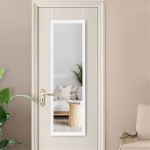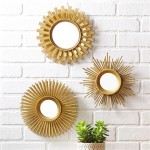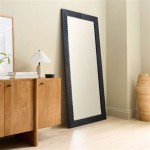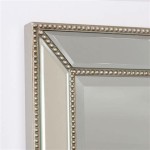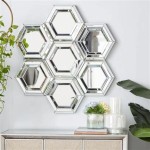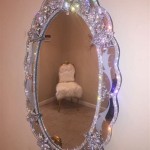Vintage Mirror Wooden Frames: A Guide to Styles, Materials, and Restoration
Vintage mirrors encased in wooden frames offer a touch of classic elegance and historical charm to any interior. These pieces, often found in antique shops, flea markets, and online marketplaces, can become striking focal points or add a subtle vintage touch to a room's decor. Understanding the different styles, materials, and potential restoration needs can assist in selecting and preserving a vintage mirror wooden frame.
Styles of Vintage Mirror Wooden Frames
Vintage mirror frames showcase a wide array of styles, reflecting the design trends of their respective eras. Popular styles include:
- Victorian: Often ornate and heavily carved, featuring motifs such as flowers, leaves, and scrolls.
- Art Deco: Characterized by geometric shapes, clean lines, and the use of materials like chrome or Bakelite in conjunction with wood.
- Baroque: Extravagant and highly decorative, often incorporating gilded elements and elaborate carvings.
- Mid-Century Modern: Simpler designs with an emphasis on functionality and clean aesthetics, frequently using light-colored woods like teak or walnut.
- Rustic: Employing natural wood finishes and simple construction, often featuring imperfections and weathered textures.
- Hollywood Regency: Glamorous and ornate, with details like gold leaf, mirrored accents, and intricate carvings.
Common Wood Types Used in Vintage Frames
The type of wood used in a vintage frame contributes significantly to its overall aesthetic and durability. Some woods commonly employed include:
- Oak: A strong, dense hardwood known for its durability and prominent grain patterns.
- Walnut: A rich, dark-colored wood favored for its beauty and carving qualities.
- Mahogany: A reddish-brown hardwood valued for its strength, stability, and elegant appearance.
- Pine: A softer wood, often used in more rustic or painted frames.
- Giltwood: Wood that has been covered with a thin layer of gold leaf, creating a luxurious and opulent finish.
Identifying Authentic Vintage Frames
Determining the authenticity of a vintage mirror frame requires careful observation and attention to detail. Key indicators of age include:
- Patina: The natural aging process of the wood, resulting in a unique color and finish.
- Wear and Tear: Minor scratches, dents, or fading can be indicative of age and actual use.
- Construction Techniques: Older frames often utilize traditional joinery methods and hand-carving techniques.
- Backings and Hardware: Examining the back of the frame for original hardware and backing materials can offer clues about its age.
Assessing the Condition of a Vintage Frame
Before purchasing a vintage mirror frame, it’s essential to carefully assess its condition. Areas to examine include:
- Wood Damage: Check for cracks, splits, wormholes, or other signs of damage to the wood itself.
- Finish Condition: Examine the finish for chipping, peeling, or discoloration.
- Mirror Condition: Ensure the mirror is free from cracks, chips, or significant silvering loss.
- Stability: Check the frame's structural integrity and ensure it is sturdy and well-joined.
Restoration and Repair Techniques
Restoring a vintage mirror wooden frame can involve various techniques, depending on the extent of the damage. Common restoration methods include:
- Cleaning: Carefully cleaning the frame with appropriate methods to remove dirt and grime.
- Repairing Damage: Filling cracks and splits with wood filler, and addressing other structural issues.
- Refinishing: Stripping and reapplying a finish to restore the frame's original appearance or create a new look.
- Replacing Glass: If the mirror is damaged, it might need replacing with a new mirror.
Caring for Your Vintage Mirror Frame
Proper care can help preserve the beauty and longevity of a vintage mirror wooden frame. Key care practices include:
- Dusting Regularly: Regular dusting with a soft cloth prevents the buildup of dust and grime.
- Avoiding Direct Sunlight: Prolonged exposure to direct sunlight can fade the wood and cause damage to the finish.
- Controlling Humidity: Maintaining a stable humidity level helps prevent warping and cracking.
- Handling with Care: Avoid dropping or bumping the frame to prevent damage.
Displaying Your Vintage Mirror
Strategically placing a vintage mirror can enhance a room's decor and create a sense of history. Considerations for display include:
- Wall Placement: Hanging a mirror on a wall can create a focal point and reflect light, making the room appear larger.
- Leaning against a Wall: Leaning a larger mirror against a wall can create a casual and stylish look.
- Placement on a Mantel or Shelf: Smaller mirrors can be displayed on mantels, shelves, or other surfaces to add a decorative touch.
- Considering the Surrounding Decor: Choosing a frame style that complements the existing decor creates a cohesive and visually appealing aesthetic.

Vintage Gold Tone Hand Carved Wood Frame Ornate Mirror 29x21 5 Framed Beveled Accent Wall Decor Ss From Peru Israel

Buy Vintage Mirror Frame In The Home Dekor

Mirror Gold Black Red Wood Frame Rectangular Vintage

Large Antique Style Carved Ornate Vintage Gilt Wood Mirror Frame 4ft X 5ft Yola Gray Antiques Interiors

Large Vintage Mirror With Carved Wood Frame 1950s

Large Vintage Geometric Mirror With Wood Beveled Frame Wall Framed Rustic Hangings

Wooden Rectangle Vintage Mirror Frames Buy 1 Get Free Handmade Carved Design

Large Antique Style Carved Ornate Vintage Gilt Wood Mirror Frame 4ft X 5ft Yola Gray Antiques Interiors

Buy Antique Handcrafted Wooden Mirror Frame Decorative Mirrors Woodentwist

Vintage Massive Wooden Frame Wall Beveled Mirror

